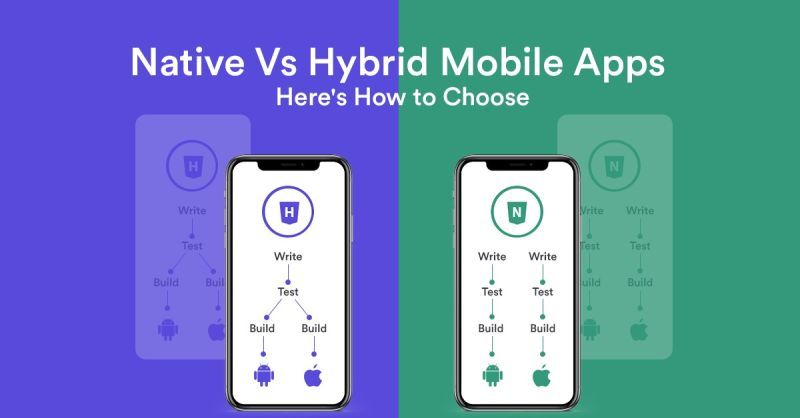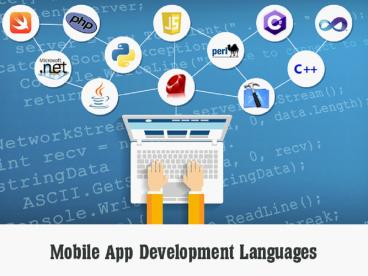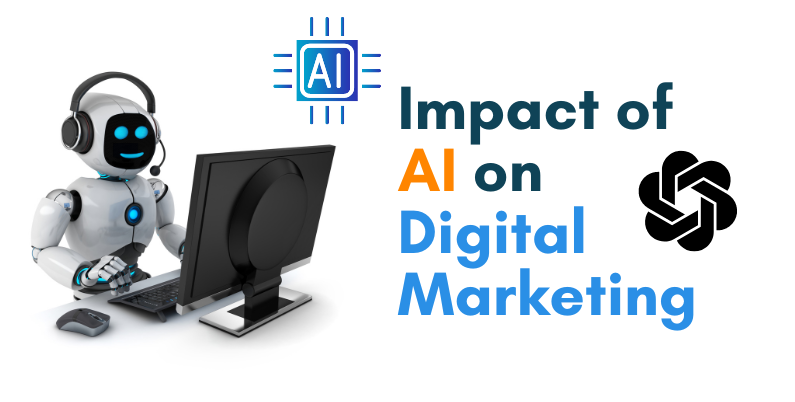HOW TO CHOOSE BETWEEN NATIVE MOBILE APP DEVELOPMENT AND HYBRID MOBILE APP DEVELOPMENT?

How to choose between Native Mobile App Development and Hybrid Mobile App Development?
Understanding the Difference between Native and Hybrid Mobile App Development
When it comes to mobile app development, there are two main approaches: native and hybrid. While both types of apps can function well, there are significant differences in terms of the development process, cost, and user experience.
What is Native Mobile App Development?
Native mobile app development involves building an application specifically for one particular platform, such as iOS or Android. This involves using the programming languages, tools, and libraries provided by the platform itself.
What is Hybrid Mobile App Development?
Hybrid mobile app development, on the other hand, involves using web technologies like HTML, CSS, and JavaScript to build an app that can be used across multiple platforms. Hybrid apps work by running inside a native app container that uses WebView, a native browser-like component.
Pros and Cons of Native Mobile App Development
Each type of mobile app development has its own set of benefits and drawbacks. Let's take a closer look at native mobile app development.
Pros of Native Mobile App Development
-
Native apps are faster and more responsive because they are optimized for the specific platform they are built for.
-
They can take advantage of the latest features and functionalities of the platform, such as cameras, GPS, and push notifications.
-
Native apps are more secure because they are built with platform-specific security features.
Cons of Native Mobile App Development
-
Developing a native app for each platform can be time-consuming and expensive.
-
Native apps require updating each time a new version of the platform is released.
-
User acquisition can be more challenging as users must specifically search and download the app from the app store.
Pros and Cons of Hybrid Mobile App Development
Pros of Hybrid Mobile App Development
-
Hybrid apps can be developed quickly and cost-effectively as they can be built using web technologies.
-
They can be used across multiple platforms, making it easier to reach a wider audience.
-
Hybrid apps can be updated easily, without requiring users to download a new version from the app store.
Cons of Hybrid Mobile App Development
-
Hybrid apps may be less responsive and slower than native apps because they rely on WebView to run.
-
They may not be able to take full advantage of the latest features and functionalities of the platform.
-
Hybrid apps may be less secure because they cannot take advantage of platform-specific security features.
Factors to Consider While Choosing Between Native and Hybrid Mobile App Development
When deciding between native and hybrid mobile app development, there are several factors to consider.
Target Audience
Consider which platforms your target audience is most likely to use. If the majority of your users are on iOS or Android, it may be worth developing a native app specifically for that platform.
App Functionality Requirements
Consider the specific functionalities your app requires. If you need to take advantage of the latest platform features, such as camera or GPS, a native app may be more suitable. However, if your app requires less platform-specific functionality, a hybrid app may be the better option.
Development Timeline
Consider your timeline. If you need to get your app to market quickly, a hybrid app may be a faster option. If you have more time and resources, a native app may be a better investment.
Development Cost
Consider your budget. Native app development is typically more expensive than hybrid development, but it may be worth the cost if you have the budget and require higher performance and functionality.
Cost Analysis: Which Option is More Cost-Effective?
When it comes to choosing between native mobile app development and hybrid mobile app development, one of the key factors to consider is cost. Both options have their own set of costs, and it's important to understand these costs before making a decision.
Factors Affecting the Cost of Native Mobile App Development
Native mobile app development involves building an app specifically for a particular platform, such as iOS or Android. This means that the development process requires a different set of skills and tools for each platform, which can increase the cost. Other factors that can affect the cost of native app development include the complexity of the app, the development team's hourly rate, and the time it takes to develop the app.
Factors Affecting the Cost of Hybrid Mobile App Development
In hybrid mobile app development, the app is built with web technologies like HTML, CSS, and JavaScript, and then wrapped in a native app container. This means that the development team needs to have expertise in both web and mobile technologies. Factors that can affect the cost of hybrid app development include the complexity of the app, the cost of the development framework, and the time it takes to develop the app.
Timeline Analysis: Which Option Takes Less Time to Develop?
Another crucial factor to consider when choosing between native and hybrid mobile app development is time. Both options have their own set of development timelines, and it's essential to understand these timelines before making a decision.
Factors Affecting the Timeline of Native Mobile App Development
Native mobile app development involves developing an app specifically for each platform, which can increase the development timeline. The timeline can also be affected by the complexity of the app, the development team's skills, and the time it takes to develop and test the app.
Factors Affecting the Timeline of Hybrid Mobile App Development
Hybrid mobile app development involves building an app with web technologies, which can reduce the development time. However, the development timeline can be affected by the complexity of the app, the development team's skills, and the time it takes to integrate the app with the native app container.
Future Trends: Which Option is More Likely to Sustain in the Long Run?
Lastly, it's important to consider which option is more likely to sustain in the long run. This means analyzing the current trends in both native and hybrid mobile app development.
Current Trends in Native Mobile App Development
Native mobile app development has been around for a long time and continues to be popular due to its high performance and user experience. However, there is a growing trend of developing apps with cross-platform frameworks like React Native and Xamarin, which allow developers to build native apps for multiple platforms simultaneously.
Current Trends in Hybrid Mobile App Development
Hybrid mobile app development is gaining popularity due to its ability to build apps for multiple platforms with a single codebase. Popular hybrid app development frameworks like Ionic and PhoneGap are continually improving their performance and user experience, making hybrid app development a viable option for many businesses.
Summary
In summary, both native and hybrid mobile app development options have their pros and cons. It's essential to consider factors like cost, timeline, and future trends before making a decision. Ultimately, the best option depends on the specific needs of the project and the skill set of the development team. In conclusion, choosing between native and hybrid mobile app development depends on several factors, including the target audience, app functionality requirements, development timeline, and cost. By understanding the differences between both approaches, businesses can make an informed decision about which option is the best fit for them. Regardless of the approach chosen, mobile app development is a vital aspect of modern business, and with careful consideration, businesses can develop apps that cater to their audience's needs and stand out in the crowded app marketplace.
FAQs
What is the difference between native and hybrid mobile app development?
Native mobile app development involves creating an app specifically designed for a particular platform, such as iOS or Android, using platform-specific languages like Swift or Java. Hybrid mobile app development involves creating an app that can run on multiple platforms, using web technologies like HTML, CSS, and JavaScript.
What are the pros and cons of native mobile app development?
Pros of native mobile app development include better performance, increased reliability, and the ability to take advantage of platform-specific features. Cons include higher development costs and longer development timelines.
What are the pros and cons of hybrid mobile app development?
Pros of hybrid mobile app development include lower development costs, shorter development timelines, and the ability to run on multiple platforms. Cons include reduced performance compared to native apps and limited access to platform-specific features.
How do I choose between native and hybrid mobile app development?
Choosing between native and hybrid mobile app development depends on several factors, including the target audience, app functionality requirements, development timeline, and cost. Consider these factors carefully and consult with experienced developers to make an informed decision about which approach is best for your business needs.






















